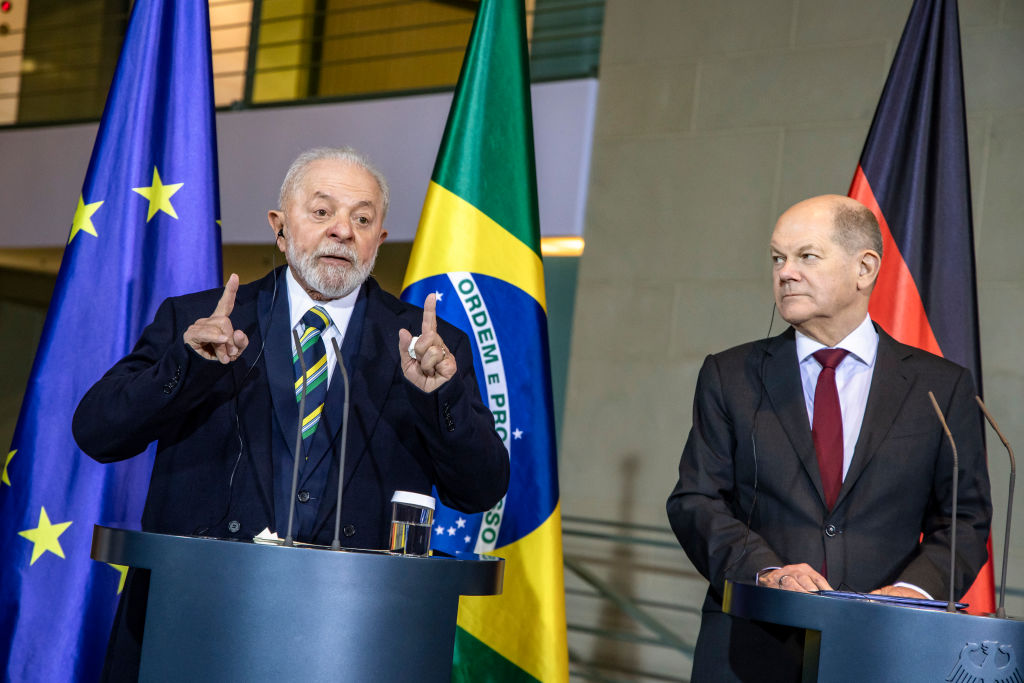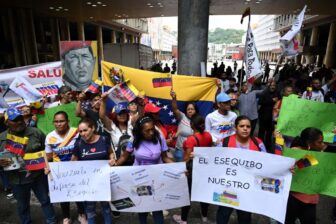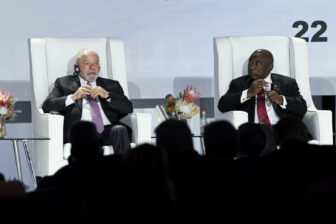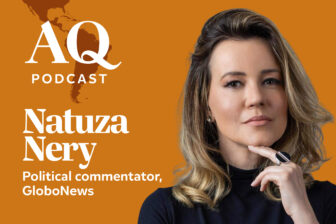SÃO PAULO— “Hope dances on a tightrope with an umbrella,” a famous Brazilian song says to enlighten us about the fragility of human existence during trying times. The lyrics convey a cautionary tale of what 2024 may represent for President Luiz Inácio Lula da Silva and his ambitious foreign policy: “At every step of the line, you can get hurt.”
If controversies marked Brazil’s foreign policy in 2023, this year promises to be a stage for new tensions and ambiguities —a tightrope of sorts for its government. After an intense first year of government, Lula is now preparing for a series of initiatives expected to draw global attention, including hosting the G-20 summit in Rio de Janeiro in November.
This year, Brazil will be caught between celebrating the bicentennial of relations with the United States—and 50 years of relations with China. It will try to preserve its capacity to mediate in the territorial dispute between Guyana and Venezuela while managing the uncertainties facing Mercosur, such as challenges in expanding intra-regional trade, high tariffs, and protectionism, as well as difficulties in finalizing external trade agreements, such as the Mercosur-European Union negotiation.
It will attempt to harmonize interests to expand its geopolitical and economic influence diversifying business opportunities and reducing dependence on rules and regulations set by Western countries in the face of the controversial BRICS+ Summit in Russia. Last but not least, it will try to convince everyone that the decision to join OPEC+ does not contradict the country’s commitment to being a green power and the host of COP30 next year.
Tension, contradictions? Nothing new. Controversy was almost inherent in Brazil’s diplomatic performance last year:Lula visited over 20 countries, participated in numerous bilateral meetings, and led multilateral mobilizations to back up his claim that “Brazil is back.” He offered to play a mediating role between Russia and Ukraine after the former’s invasion and was criticized for hesitating to assign responsibility to Moscow for the war.
Lula also participated in a BRICS Summit in Johannesburg, where the bloc proposed including Iran and other countries, and while attending COP28 in the United Arab Emirates, he confirmed Brazil’s entry into OPEC+, a group that includes the oil cartel nations and ten observer countries. On another front, Brazil proposed de-dollarizing trade with China, and in the region, Lula made a controversial outreach to Nicolas Maduro’s government in Venezuela during its pro tempore presidency of Mercosur.
A busy year
For what lies ahead, Brazil’s international agenda might seem contradictory. But there’s a clear logic that stems from its unique position in the world and its ambition to become a truly global player. To that end, Brazil needs to cultivate partnerships from which it can obtain tangible benefits rather than alliances.
The Lula government’s vision for accomplishing this goal is not the only one on offer in Brazil. Still, it has a lot of appeal among decision-makers and significant buy-in from society. Its pursuit of autonomy through what is sometimes called “active non-alignment” focuses on three key goals: diversifying partners, focusing on development, and democratizing global governance to make its voice heard.
This year’s G20 Summit, scheduled for November, will put those priorities on clear display. There, Brazil’s agenda is set to emphasize hunger, poverty and inequality, sustainable development, and global governance reform. Over 100 working group meetings and 20 ministerial meetings will advance that goal, and two permanent task forces will be introduced: the Global Alliance against Hunger and Poverty, and the Global Mobilization against Climate Change. The latter foresees greater participation by developing countries in institutions such as the World Bank and the International Monetary Fund and revitalizing the World Trade Organization.
Big ambitions
In 20 years, Brazil will likely assume a leading role in strategic areas for global stability. Brazil’s geographical, demographic, and natural resource importance means it will be pivotal in food security, energy security, and technological development.
Brazil is already one of the largest producers and exporters of agricultural products on the planet and is investing in advanced farming practices that make it even more efficient and competitive. It also has excellent potential to expand its capacity in renewable energies, becoming a global reference in clean and sustainable energy. Finally, with a significant internal market, a young population, and substantial reserves of inputs such as lithium, Brazil could make essential contributions in fields such as biotechnology, information technology, and artificial intelligence.
With these ambitions in mind, Brazil’s foreign policy seeks to avoid being reduced to binary questions of “us versus them” and resists the tendency to dismiss the legitimacy of its interests or its own agency in negotiation processes. The goal is to have more interlocutors, be involved everywhere, and win support to make international institutions more representative.
What will help accomplish that is the politics of “and” more than the politics of “or.” That means maintaining close relations with both the global North and South and convincing OPEC countries to invest in the energy transition and green hydrogen to reduce the use of fossil fuels—but without confronting them. It means promoting discussion between the G7 and BRICS+.
This approach has its risks. The pursuit of autonomy, “non-alignment,” and international institutional reform has drawn criticism from established global powers, especially the United States. And there’s also the risk that some countries—like Russia and China—could exploit this movement to build a system that favors them. But these uncertainties must be managed in a world in the midst of transformation.
The song O Bêbado e a Equilibrista, originally performed by Elis Regina and released in 1979 during the military dictatorship, emphasizes the delicate equilibrium of human hope in difficult times. This is the challenge of Lula’s foreign policy in 2024: to keep its balance—and, if it falls, to ensure the fall doesn’t hurt too much.
—
Magnotta is a Senior Fellow at the Brazilian Center for International Relations and a professor and coordinator of the International Relations Program at Fundação Armando Alvares Penteado in São Paulo.








